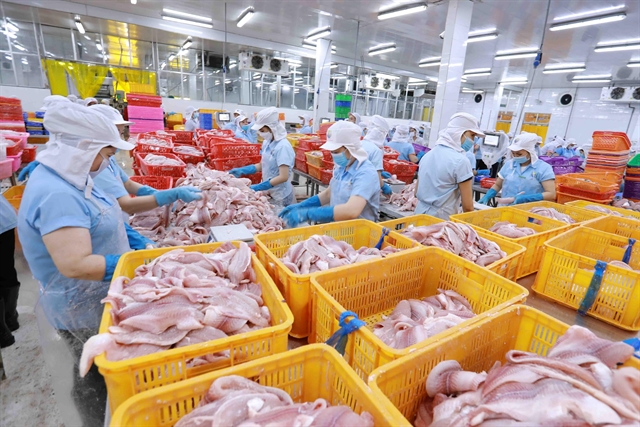
|
| The fishery industry sets an seafood export target of $9.5 billion despite predicting that this industry will continue to face many difficulties in 2024. —VNA/VNS Photo Vũ Sinh |
HÀ NỘI — The Ministry of Industry and Trade (MoIT) aims to increase total export turnover in 2024 by about 6 per cent compared to 2023 and maintain a trade surplus of about US$15 billion for the ninth consecutive year.
To reach this target next year, it is forecast to face many difficulties and challenges as the export value target in 2023 has not been completed. Specifically, the export value in 2023 is estimated to reach about $355 billion, down 4.5 per cent over the same period last year. It does not reach the planned growth target of 6 per cent.
According to the ministry, along with taking full advantage of existing free trade agreements (FTAs), FTAs with new markets such as Israel and the UAE will create more opportunities to promote trade and investment, especially exports, of Việt Nam in 2024.
Good political relations have been strengthened and upgraded with major partners such as China, the US and the EU, creating a premise for expanding economic, trade and investment cooperation.
Now, a number of Việt Nam’s key export industries have set growth targets for 2024.
Trương Văn Cẩm, vice chairman and general secretary of the Vietnam Textile and Apparel Association (VITAS), said that with 2023 export turnover reaching $40.3 billion, the industry sets an export target of 2024 to reach $44 billion, an increase of 9.2 per cent.
The seafood industry sets an export target of $9.5 billion despite predicting that this industry will continue to face many difficulties in 2024, especially the European Commission (EC) maintaining a yellow card warning for exploited seafood products in Việt Nam.
The Ministry of Industry and Trade believes that by 2024, the world and domestic economic situation will have more positive factors for import and export activities. Of which, the US Federal Reserve (FED) has issued a message to stop raising interest rates and consider reducing interest rates in 2024.
However, the ministry has also noted the trend of having more and more trade protection. Some countries bring investment back home, and erect trade barriers to protect and promote their country’s production.
Therefore, Nguyễn Cẩm Trang, deputy director of the MoIT’s Import-Export Department, emphasised that to achieve the export growth target of 6 per cent next year, the ministry will promote negotiations and signing of new agreements, commitments, and trade links, sign FTAs and trade agreements with other potential partners, such as the UAE and South America, to diversify markets, products and supply chains.
The Import-Export Department will continue to support the businesses to take advantage of commitments in the FTA to boost exports, and shift to official exports associated with brand building.
Trade promotion is one of the important activities to promote export growth.
Therefore, the Department of Trade Promotion in 2024 will exchange and coordinate with localities, industry associations and businesses to evaluate the export situation and support them to develop markets and promote the consumption of goods.
In addition, the Department of Trade Promotion will regularly update policies and changes in standards and conditions of export markets so that businesses and industry associations can understand and have suitable plans and strategies for production and business.
For the textile and garment industry, to achieve the export target of $44 billion, Trương Văn Cẩm said VITAS will promote solutions on market, human resources, science – technology and raise capital, and investment in sustainable development.
The textile and garment industry will continue to diversify its supply of raw materials and accessories as well as expand export markets, by improving marketing capacity and seeking for direct customers, Cẩm said.
Currently, requirements on green and sustainable economic development are gradually forming new rules in the trade. Many economies around the world have set stricter environmental regulations for imported goods. Green export is an inevitable trend, so Việt Nam is not out of this game.
The VITAS representative also hopes support in interest rate will be implemented faster to create favourable conditions for the businesses in expanding production and having more resources for green transformation according to new regulations of the world market.
Meanwhile, Trang proposed the MoIT to have supports for the businesses to overcome new trade barriers in import markets.
The ministry will support for them in the development and implementation of large-scale trade promotion activities for key products and industries in target markets, she said.
Minister of Industry and Trade Nguyễn Hong Diên said that Vietnam trade offices abroad need to provide information about the market and new regulations and policies of the host country. Thereby, they have early warning of new barriers from partners, help State management agencies and the businesses to have appropriate policy responses, and improve efficiency in export activities.
Economic expert Dr Cấn Văn Lực said that in addition to reduced export orders, many businesses face difficulties because the supply chain is still risky and input costs are high. In particular, the trend of greening and circular business is a big challenge for the enterprises.
Therefore, the enterprises need to diversify capital sources, markets, partners, and supply sources. They also need to proactively apply green production, green consumption, and circular business models to improve efficiency in production and export. — VNS
- Reduce Hair Loss with PURA D’OR Gold Label Shampoo
- Castor Oil Has Made a “Huge” Difference With Hair and Brow Growth
- Excessive hair loss in men: Signs of illness that cannot be subjective
- Dịch Vụ SEO Website ở Los Angeles, CA: đưa trang web doanh nghiệp bạn lên top Google
- Nails Salon Sierra Madre
 VnExpress News The News Gateway of Vietnam
VnExpress News The News Gateway of Vietnam




